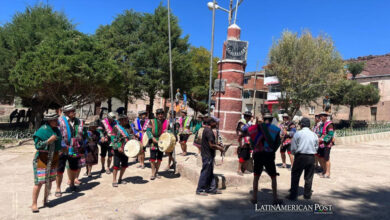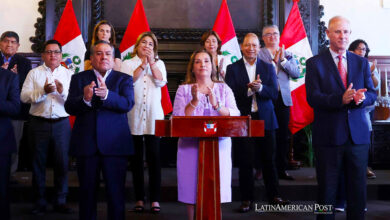Bolivian Government Seizes Over 207 Kilograms of Cocaine Destined for Brazil
Bolivia is a transit country for cocaine in route to international markets, particularly in Brazil. The country's proximity to Brazil's extensive and lucrative drug market has made it an attractive gateway for traffickers.

Photo: Pixabay
The Latin American Post Staff
Escucha este artículo
Leer en español: Gobierno boliviano incauta más de 207 kilogramos de cocaína con destino a Brasil
The Bolivian Government announced the seizure of over 207 kilograms of high-purity cocaine, valued at nearly half a million dollars, hidden in a tractor-trailer from Peru to Brazil.
The discovery occurred during an inspection at an anti-drug checkpoint on the outskirts of La Paz, which identified "modifications" to the vehicle's structure, stated the Deputy Minister of Social Defense, Jaime Mamani.
Also read: From Drug Lord For The United States To Decorated For Mexico: AMLO Recognizes The Work Of Cienfuegos
Concealed Compartments and Arrests
The Deputy Minister indicated that the drugs were concealed in two compartments within the truck behind the cab and in the trailer, where they found 98 and 109 kilograms of cocaine, respectively, packaged in sealed adhesive tape.
The investigation also determined that the tractor-trailer had come from Peru, where it had been loaded with coca cocaine hydrochloride, and its intended destination was Brazil via Bolivian territory. As a result, two individuals have been arrested, he added.
In the operation on October 15th, "an estimated 453,700 dollars (430,581 euros) have been seized from drug trafficking," reported the Deputy Minister.
Mamani stated that this year, approximately 18.5 tons of cocaine of varying quality and over 367 tons of marijuana have been seized in about 8,273 anti-drug operations across all nine regions of the country.
Furthermore, 480 "base paste" cocaine factories and 85 drug purification laboratories were destroyed, in addition to the seizure of 44 aircraft used by drug traffickers and the destruction of 65 clandestine runways.
The Deputy Minister elaborated that 301 tons of coca leaves, the raw material for cocaine production, were also confiscated and "diverted from illegal activities."
Legal and Illegal Coca Production
In Bolivia, the consumption of coca leaves is legal when used traditionally as food, medicine, or for ritual purposes. However, organizations like the United Nations have warned that part of this production is in the illegal market.
The United Nations Office on Drugs and Crime (UNODC) stated in its annual report at the end of last year that in 2021 coca leaf cultivation in Bolivia increased by 4%, from 29,400 hectares in 2020 to 30,500 hectares in 2021.
Nonetheless, the Ministry of Government asserted that the UNODC data differed over 1,300 hectares due to "measurement errors."
Cocaine Trafficking from Bolivia and Peru: A Persistent Challenge
Cocaine trafficking is a significant issue in Peru, as the country is one of the world's largest producers of coca leaves, the primary ingredient in cocaine. Peru has vast coca cultivation areas, primarily in remote regions like the Huallaga Valley and the Apurímac, Ene, and Mantaro River Valleys (the VRAEM). The country's extensive coca fields provide a steady supply of coca leaves for cocaine production.
Bolivia has long been associated with cocaine trafficking, owing to its role in the production and distribution of the drug. Cocaine is derived from coca leaves, which have traditional and legal uses in Bolivia, such as rituals, medicine, and food. However, the illicit production of cocaine has remained a significant concern for the country and the international community.
Bolivia's coca cultivation is legal under specific circumstances, making it challenging to differentiate between licit and illicit coca. This legality creates opportunities for drug traffickers to use legal coca crops as cover for their illegal activities. The presence of legal coca cultivation adds a layer of complexity. Balancing traditional uses with law enforcement measures against cocaine production remains a significant challenge for the Bolivian government.
The country hosts cocaine production hubs where coca leaves are processed into cocaine. These facilities range from small, mobile operations to larger, more sophisticated laboratories.
Bolivia is a transit country for cocaine in route to international markets, particularly in Brazil. The country's proximity to Brazil's extensive and lucrative drug market has made it an attractive gateway for traffickers.
Cocaine trafficking remains a persistent challenge for Bolivia, Peru, and the broader international community. Combating this issue requires a multi-faceted strategy considering the country's traditional coca uses and its role in the global drug trade.





